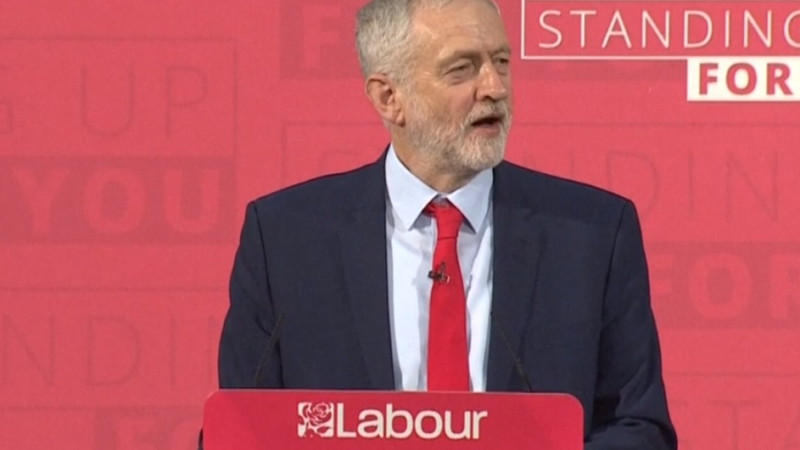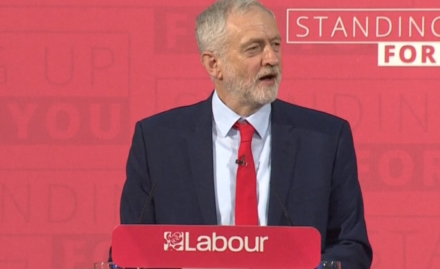

Theresa May’s decision to break yet another promise and force Britain into a general election is less about bringing forward the 2020 vote and more about delaying the first post-Brexit poll.
She knows she needs time at the other end of the final Brexit outcome to implement the transition deals and re-stabilise the economy. Why? Because she cannot meet the high expectations of the UKIP-lite tendency in her party and will not be able to get a deal that does not harm working people in Britain.
Labour must use this election not to “change the question” but to make that point. Yes, May calls the election from a polling advantage – both the party and her personally are ahead in the polls – but on policy, it is from a point of weakness. The country needs an opposition to point this out and a plan about what could reasonably done instead. The leadership must make this their focus, and ensure it does not slip into hard-Brexit and give May a blank cheque. She certainly does not deserve one.
So what can Labour do to make the biggest impact, return as many Labour MPs as possible and look like we are aiming to win?
First, elections are about the public and not the party. It was extremely disappointing – and contrary to all Corbyn’s previous statements about a desire for unity – for the leader to entertain, let alone actively pursue, anything other than automatic re-selection of MPs. Not only would 2,000 branch meetings in the next two weeks be impractical, it sends the wrong signal to the public that the Labour leadership are using this election to fight a factional war inside the party, not for the future of the country.
Corbyn needs to have 12 to 14 million British voters in mind at all times, seek to build a pre-election coalition of voters (not a post election stitch up) and not get caught in the hype of an election rally and ignore the masses outside the hall who will decide an election.
Remember, Michael Foot had standing room only rallies in 1983. The clapping in the hall was later deafened by the verdict of the public.
Second, it is important to live by the rule of “show, don’t tell”. An election is not an opportunity for the leadership to tell the voters that “this is an opportunity to put [Labour’s] case to voters and that is what we will do”, as Corbyn did on Tuesday. It is an opportunity to actually do it. All airtime the shadow cabinet has is precious – just start making the Labour case. Anything else is wasted time.
Neither should he get into arguments with journalists about the questions they ask. That will become the story, rather than the issues he wants to talk about. Rightly or wrongly, his team may have felt it was a useful way to get media coverage before, but in a short campaign they can count on coverage anyway. He should use it wisely.
Third, the Tories’ votes count as double. Unlike when Labour wins a supporter from the Liberal Democrats, UKIP or Greens, a vote from the Conservatives is one off their pile and one onto ours. Labour should always remember who the enemy is – not Labour MPs but Tory ones. Corbyn must set this tone. At the same time, the reverse is true. If Labour is haemorrhaging to the Tories it is have twice the impact of any other support it might lose.
Fourth, incumbent MPs know their patch best. In the same way Corbyn and John McDonnell had their own manifestos in the general elections in the last five general elections, so will Labour MPs across Britain this time. This will stem the tide that is coming Labour’s way. The leadership must let them and allow Labour to continue as a broad church.
Fifth, never give up on aspiration. Historically, Labour’s successful electoral coalitions have always been about bringing together working class and middle class voters with the same aim of building a society that is fairer for everyone. Pitting people against other and putting a cap on the acceptable limits of aspiration has never been the route to victory before. We need to remember that.
People on £70,000 might be well off compared to average earners but they are not “the rich” – not by a long shot, as McDonnell seemed to suggest this week. They are not people who avoid tax, or have high paid accountants to exploit loopholes. They do not live in mansions. In whole swaths of the country people on those salaries, let alone those approaching such amounts, are often hit by many of the problems Labour exists to challenge – children with high levels of student debt, stuck on NHS waiting lists because they could never afford to go private, and expensive childcare costs. For families who live on £70,000 made up from two incomes, life will not feel particularly plush.
If Labour got slammed by voters who did not earn high incomes in the 1992 election for its top rate tax pledges, then imagine how focusing the hard-left’s desire to tax and spend on those earning £70,000 a year or more could affect Labour. While only a limited number will earn this amount, many more will earn amounts approaching it or more as a household income. Equally, many will know someone who earns that kind of money – maybe their boss or their boss’ boss. That is highly attainable, let alone aspirational. These people must be able to vote Labour.
Sixth, answer all the big questions. Standalone, piecemeal policies may be individually popular, but do not add up to a narrative for what Britain would look like: introducing free school meals will not fix a “rigged system”. Corbyn must have big ideas for what the country would look like under his leadership and it is time to let the voters know, rather than just saying things should be “fairer”. All the while, he should be aware that unless he gains the trust of the country on the issues they care most about – such as immigration and crime – he will not have the permission from the electorate to carry out radical changes in other areas.
There are five big questions voters ask of parties. Will you run the economy so I can afford my mortgage? Will my kids have a good school in the area to attend? Will the NHS be there when I, or my elderly relatives, need it? Will the police turn up when a crime takes place and will they have some reasonable chance of catching the perpetrator? Will the next generation do better than the current one?
Answering these questions well is the key to winning in marginals. In 1945, 1964, 1997, 2001 and 2005 Labour had convincing answers for each. Only having answers for some of them leads to defeats such as in the last two elections. Refusing to answer them at all leads to a defeat like 1983.
Finally, Corbyn has to take himself seriously. He is the leader of the opposition. He should focus out. He should not talk like a hard-left Donald Trump – privy councillors and those with more than 30 years in parliament will find it hard to maintain they are anti-establishment. And crucially, he should not lower himself to a challengers’ debate without May present – when Ed Miliband did that all the smaller parties saw it as an opportunity to throw every attack at him. They will do the same to Corbyn.
Richard Angell is director of Progress.




More from LabourList
Sadiq Khan signals he will stand for a fourth term as London Mayor
Starmer or Sarwar: Scottish Labour MSPs and MPs split over Keir Starmer’s future
‘Every Lidl helps: What can the Government do to bring down food prices?’